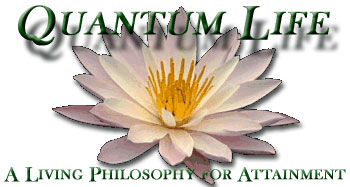of USAWKF
- Volume One
- Volume Two
- Volume Three
- The Truth Within
- On Securing Peace
- New Year's
- For Women
- Quantum Life Practitioners
- Letter to Mom
- On sharing epiphany
- For relationships
- On persecutions and commitment
- On Revelations of The Path
- The Key to Joy
- The Buddha Mind
- The Universal Truth is the timeless Entity of Life
- The World shakes in all ten directions
- Exigency in Dedication to the Truth
The Buddha Mind
Question; the doctrine of Quantum Life suggests that we are all of one energy and that we alone are responsible for all phenomena; And that we are all living lives of delusion and suffering as the result of our existence. So how does the Buddha mind end this suffering?
Answer; birth, sickness, old age, and death are indeed the four sufferings all religions and philosophies attempt to alleviate. It would seem also, that life itself, consisting of these four and more, is designed to inflict suffering. As we study the great texts of world, of the Vedas, Judaism, the Qur'an, and even the culminating teachings of Buddhism, one can get the idea that al life's sufferings can only be eliminated by ending this mortal life and to attain some judgement or passage into another realm where peace, joy, and happiness are guaranteed. The basic understanding, although greatly misrepresented, misunderstood, or completely obfuscated for egotistical purposes, of our complicity in the creation of all earthly phenomena is obvious in all teachings of great acceptance. From "original sin" to "transported" for testing or atonement, to myriad other conjecture, all sacred texts point to the basic truth that we are responsible for the phenomenal world.
This is a symptom of the illusions and the catalyst for suffering. This
is always the by-product of differentiation. When there is differentiation,
there is in-equality. When there is in-equality, there is always a struggle
for balance. Once you can accept that all phenomena are equal and that
all differentiation is illusion, suffering disappears. This is truly a
difficult state to reach and requires dedicated practice.
Question; it would seem that the development of the Buddha mind is an
acceptance of non-differentiation. Would this not equate to a state of
non-existence, or death?
Answer; this is a deficiency of many Hiniyana and provisional teachings of all sacred texts. The difficulty of attaining the Buddha mind is so much a time consuming practice that teachings end most of their goals at the attainment of this reality or truth alone. As I have written previously and recorded in Quantum Life, the realization of the Buddha mind has greater dimension than the mere realization of the non-differentiation of all phenomena. This is the limitation of a great many meditative practices whose only goal is to achieve this unity with, the void, or the oneness, or God or Allah, et al.
Certainly, to attain this level of awareness is to have achieved a great deal. From this awareness, one may develop tremendous compassion. This deserves great merit. To achieve this awareness is also to begin to appreciate the Buddha mind, but it is not the Buddha mind. The critical component of awareness to develop when one achieves understanding of non-differentiation is to know that all phenomena are the manifestation of motive force in the form of will. It is not important to know the specific desire of the will. It is paramount to understand that once motive force is invoked, the resultant and requisite differentiation is infinite and determined only by the broadest parameters of the motive force.
Another way to express this is to know that once a course of action is decided upon, myriad random and non-random events become possible and not possible in accord with the parameters of that course of action. The Buddha mind then is not affected by the myriad events that occur around it. The Buddha mind understands all actions as the result of motive forces of differentiation, which is a world of illusions. Illusions constructed of the Buddha mind's own existence. For, without the Buddha mind there can be no motive force or will and there can be no understanding of differentiation.
This is what is meant by the formlessness of the Buddha mind. All dualities and all non-dualities, all phenomena and non-phenomena are the Buddha mind. In non-states, the Buddha mind is at rest, and in manifest states, the Buddha mind is in a waking state. This waking state is what is meant as the state of "becoming". In fact, this waking Buddha mind state is only available to extant phenomena. This is simply logic. So the waking Buddha mind is available only to sentient beings with the ability to perceive the self. This is the key to understanding the tremendous value of all life, but especially the unique privilege of human life.
With the Buddha mind one can observe the truth of all phenomena without being affected and therefore make no causes for differentiation and thereby avoid sufferings. This is the objective of daily practice and the meaning of the teaching that all living beings can attain enlightenment in this lifetime and avoid the sufferings of birth, sickness, old age, and death.
Question; with this Buddha mind I could then observe the events of my daily life without getting affected by the emotions and illusions of those events and thereby avoid causes and reactions that would bring suffering by simply understanding that all those events exist outside myself?
Answer; The Buddha mind allows one to understand one's complicity in the events that surround us without being influenced in one's life state. This awareness permits for compassionate action and clear decision making to create courses of actions that contribute to peaceful resolution, loving understanding and the sanctity and dignity of life. Nothing is ever "outside" one's self.
Respectfully,
Reverend Sylvain Chamberland
BACKGROUND
In this treatise, Reverend Sylvain follows the theme of his letter, The
Key to Joy, and elaborates the concept on the Buddha Mind and its corollaries
in the mortal life as that of attitude.












